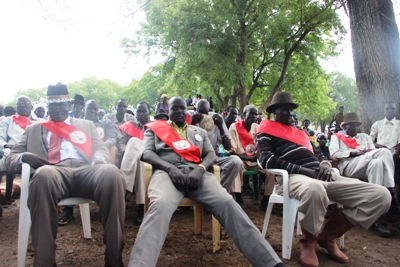Life compensation to resolve sub-clan fights in Jonglei state
August 11, 2015 (BOR) – Authorities in Twic East county of South Sudan’s Jonglei state have passed a local order directing the two clans of Dacuek and Ayuel, which have been in conflict since 2010, to compensate the 29 lives lost to end conflict in Nyuak payam.

No attack or counter offensives have occurred between the two communities since they signed an agreement in August last year. The accord was to end conflict by compensating lives lost in fighting.
“After the signing of the deal in August 2014, the communities started to again live together, go to the same churches and had shown progress in different aspect of life,” said the Twic East county commissioner, Dau Akoi, adding, “Life seemed back to normalcy”.
However, not all the chiefs in the county seem to respect provisions of the agreement. For instance, Ayuel, one of the largest clans in Twic East has 19 chiefs representing all its sub-clans, yet only 13 of them are reportedly committed to peace. The 13 chiefs of Dacuek pledged commitments to the accord, calling for its implementation.
COMPENSATION FUNDS COLLECTED
Last year, it was agreed that Dacuek contributes SSP 800,000 to compensate 16 lives lost to Ayuel. In return, Ayuel was to contribute a total of SSP650, 000 to compensate for the 13 lives lost in Dacuek.
Ayuel chiefs who are loyal to the agreement have contributed SSP151,200 while Dacuek contributed SSP724,900, totaling to 876,100.
Traditionally, paying 50 heads of cattle would compensate each life lost. But in this particular agreement, the two communities agreed to settle the matter monetarily, earmarking SSP50,000 for each life lost.
Some of the chiefs have, however, expressed concerns over the refusal by their six counterparts to adhere to agreement framework. They argued that compensation not be effected and money returned to their owners, if the chiefs continue to dishonour the deal.
According to Akoi, the conflict in Twic East has affected lives and disrupted studies of youth in South Sudan and neighbouring countries.
“If all is implemented, then we will wait to see who will break it again. We have amnesty to those who killed. The killings were to be handled by the communities, not as individuals, that is why we did not arrest anybody. After this one, if you kill anybody, you will be held accountable for killing as individual”, he told Sudan Tribune on Tuesday.
Deng Ajak, an intellectual from the Ayuel community, said peace was essential for youngsters to enjoy in schools as well as institutions.
“I have my son who is learning outside South Sudan. He is one of the young men who lived in fear because of this war. Why should we create problems to our own sons when we are not targeting ourselves as elders? Stop this and let the youth enjoy peace”, he said.
(ST)
